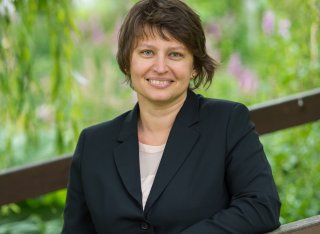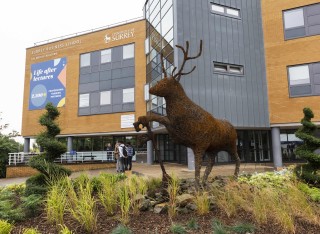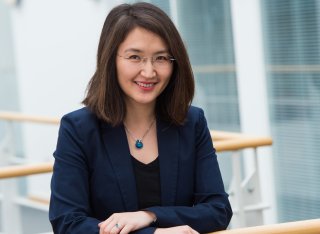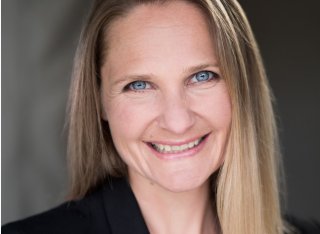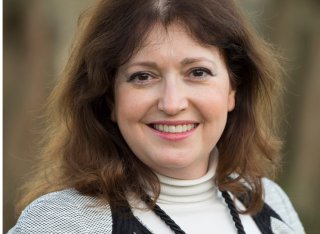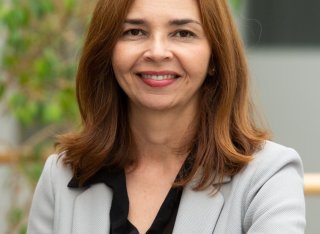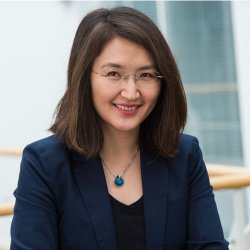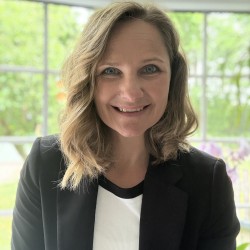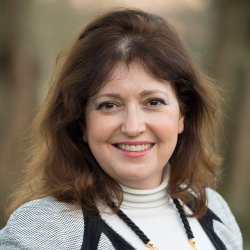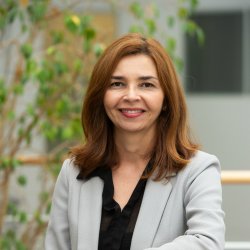Celebrating the Women of Surrey Business School
To celebrate International Women's Day on 8 March and Women's History Month, discover the stories, advice and expertise of several of our Research Centre Directors, as they discuss their journey and research here at Surrey Business School and what #EmbraceEquality means to them.
Dr Irina Cojuharenco, Director, University of Surrey Business and Economics Experiments (USBEE) Laboratory
When did you join Surrey Business School and what is your role here?
I joined back in 2017, and my current role is Associate Professor in the Department of People and Organisations and the Founding Director of the University of Surrey Business and Economics Experiments (USBEE) Laboratory. I am also a fellow of the Surrey Institute for People-Centred AI, and member of the Future of Work Research Centre and CoDE.
What does your Research Centre explore?
The Lab I lead enables researchers across the university to run studies of human behaviour with the help of University of Surrey-based research volunteers. Some of the questions we explore currently are:
- How do humans interact with digital coaches and other non-human ECAs (embodied conversational agents)?
- How may VR experience enhance the understanding of statistics?
- How are pandemic and post-pandemic responses shaped by the language we use?
Lab studies are run online and in physical labs on campus, and anyone who signs up at https://usbee.surrey.ac.uk gets notified about opportunities that may appeal to them. We are immensely grateful to the students, alumni, and community members who help advance behavioural research at our University.
What advice would you give to any women looking to develop a career in your area of research?
Experiment! Experiment with topics, with methods, with collaborations within and across disciplines, teaching strategies, modes of communicating the outcomes of your research and ways of producing impact!
The 2023 International Women’s Day theme is #EmbraceEquity. What does equity mean to you?
As someone who studies organisational justice, I define equity narrowly, keeping in mind that a broader concept is justice. Equity is about comparability of rewards to contribution ratios of individuals in organisations, but there are also procedures that lead to specific outcome allocations and whether individuals get treated with honesty, dignity and respect during the implementation of those procedures. I’d say #EmbraceJustice, and I think of justice as “glue” that keeps collective endeavours on track to create value far exceeding what individuals could accomplish alone!
Professor Ying Zhou, Director of the Future of Work Research Centre
When did you join Surrey Business School and what is your role here?
I joined Surrey Business School in 2011. I am Professor of Human Resource Management and Director of the Future of Work Research Centre at University of Surrey.
What does your Research Centre explore?
The Future of Work Research Centre pursues ground-breaking interdisciplinary research to understand the changing nature of work and employment relationships, the forces that support these changes, and their impact on organisational effectiveness and human well-being. The centre’s research is anchored in the belief that work is a distinctively human endeavour through which individuals live meaningful and fulfilling lives as they strive to build prosperous, fair and inclusive societies.
What advice would you give to any women looking to develop a career in your area of research?
We are keen to work with researchers who are passionate about transforming the world of work. We welcome interdisciplinary research which employs a range of methodologies and examines both macro and micro issues. Researchers in the Future of Work Research Centre aim to generate rigorous and actionable knowledge to create a work environment in which individuals live productive, fulfilling and happy lives.
The 2023 International Women’s Day theme is #EmbraceEquity. What does equity mean to you?
In the context of work and employment, equity means that individuals have fair access to opportunities for recruitment, training, development and reward regardless of their demographic characteristics. Everyone should feel welcome and valued in an inclusive workplace.
Find out more about the Future of Work Research Centre
Professor Christine Rivers, Co-Director of the Centre for Management Education and Director for Learning and Teaching
When did you join Surrey Business School and what is your role here?
I joined Surrey Business School in September 2011 after working as a research assistant in the Department of Sociology at Surrey and successful completion of my PhD also at Surrey. Since then, I have held many leadership roles in the school and taught many subjects. In 2016 I launched the Centre for Management Education, and I am now a Professor of Management and Mindfulness Education here.
What does your Research Centre explore?
The Centre for Management Education (CME) is a competency centre rather than a research centre. Our focus is to provide support for Management Educators inside and outside Surrey and enable innovation in learning and teaching and advancement of our profession through career development, leadership workshops, teacher qualifications, coaching and opportunities for scholarship in teaching and learning (SoTL).
What advice would you give to any women looking to develop a career in your area of research?
Two pieces of advice: self-care and connect.
1. Self-care: Find a mentor or coach to develop professionally and personally, to carve out your own trajectory. I have coached many people over the years and I enjoyed contributing to their growth as well as utilising my own global connections to plug them into the community.
2. Find like-minded people inside and outside your organisation and connect. Connection can be found through joining several professional bodies such as the British Academy of Management or Chartered Association of Business Schools in the UK or Academy of Management (AoM), or the Association to Advance Collegiate Schools of Business (AACSB) globally. It is those relationships that will carry you through challenging times.
The 2023 International Women’s Day theme is #EmbraceEquity. What does equity mean to you?
A general definition of equity would be the quality of being fair and impartial. Personally, equity is a core value of who I am, how I act, think and feel, how I make decisions, how I live at work and at home. Everything I do should be equitable for those receiving my services. It doesn’t matter who they are, where they were born, or what gender, beliefs, or political views one has. In the context of my work here, equity is about providing fair and just leadership, learning and teaching to the community.
Annabelle Gawer, Director of CoDE, the Centre of Digital Economy
When did you join Surrey Business School and what is your role here?
I joined Surrey Business School in 2016. I am Chaired Professor in Digital Economy and the Director of CoDE, the Centre of Digital Economy at Surrey Business School. My own research is on digital platforms and innovation ecosystems. For over 20 years, I have been a leading scholar and a thought-leader on the business of digital platforms and innovation ecosystems, which constitute the dominant business model of our times.
What does your Research Centre explore?
CoDE is a leading research centre whose mission is to push the boundaries of knowledge and management practice in the Digital Economy through leading-edge research and deep engagement with business and government. We do research on a variety of fascinating topics, ranging from the power of BigTech platforms to fake news in social media, to how blockchain is transforming supply-chains. We always look to support and to connect to interesting research that explores any dimension of the digital economy, be it economic, managerial, social, or organisational.
What advice would you give to any women looking to develop a career in your area of research?
My general advice is to look for an environment that is supportive of what you are trying to achieve, and this means not only of who you are, but also of who you are trying to become. Choose wisely whom you spend your time with, both at work and at home. And if the environment does not suit you, if you’ve tried your best but it still does not work, then have the courage to leave and look for a better environment.
It’s never easy to be in a minority, whether it’s gender-based or otherwise. Seek out mentors and cultivate relationships with colleagues both inside and outside your direct environment, people who know or have empathy with what’s it’s like to be you, at your stage in your career, or for example who have had to deal with similar situations such as the one you face - be it caring for young or old family members.
One last piece of advice: if you think something is interesting, don’t let anyone tell you it’s not! You might just be ahead of the curve, and there is value in persistence.
The 2023 International Women’s Day theme is #EmbraceEquity. What does equity mean to you?
To me, equity means fairness, and it means everyone has (or should have) a chance to develop his/her/their potential. Equity is an inspirational value, and one that binds people together as it’s one that many people can get behind, at least in principle. However, in practice, it is actually rare to find work environments where the people in charge don’t just “talk the talk”, but also “walk the walk”. I have found that Surrey Business School at the University of Surrey is one of those rare environments where the culture is positive, collegial, genuine, and respectful of people. This is why I have been very happy at the University of Surrey.
Dr. Stelvia Matos, Head of the Centre for Social Innovation Management
When did you join Surrey Business School and what is your role here?
I joined Surrey Business School in 2018. As a Reader in Social Innovation & Sustainability Management and head of the Centre for Social Innovation Management (CSIM), I divide my time between research, teaching, administration and the Technovation co-editorship. My research focuses on understanding the complex interactions among social, environmental and economic factors, and how they affect, and/or are affected by innovation dynamics, entrepreneurial behaviour and policy development.
What does your Research Centre explore?
CSIM is a problem-driven inter-disciplinary research centre looking at societal grand challenges such as climate change, social exclusion, digital innovation, business ethics, sustainable supply chains and global health issues. We pay attention to the challenges of the innovation/entrepreneurial process and how to identify the favourable conditions that lead to what William Baumol called productive entrepreneurship, or in other words innovation that results in more winners than losers, which in turn should promote sustainability and avoid unanticipated detrimental outcomes.
We find important to ask whether our ‘good intentions’ inevitably result in more sustainable societies, or whether they also result in unintended consequences that will need to be addressed later. Rather than treating unanticipated outcomes as exceptions, they should be seen as inevitable, explored and managed as early as possible.
What advice would you give to any women looking to develop a career in your area of research?
Choose a research topic that you find interesting, meaningful and addresses real world problems. Doing research is hard work, requires resilience, perseverance and patience. I’ve always been a strong advocate of problem driven research, which can lead to great theory building and contribute to management practice, as long as importance and rigor are present.
The 2023 International Women’s Day theme is #EmbraceEquity. What does equity mean to you?
Equity for me means to recognise the value and quality of insights that can be found by engaging with the poor, the marginalised, the one from a totally different culture, not as a monolog but as a dialog. What is social justice and equity for a woman from the Global North may not be the same for a woman from the Global South. We have a lot to learn from each other on what factors need to be considered to effectively embrace equity.
Find out more about the Centre for Social Innovation Management
